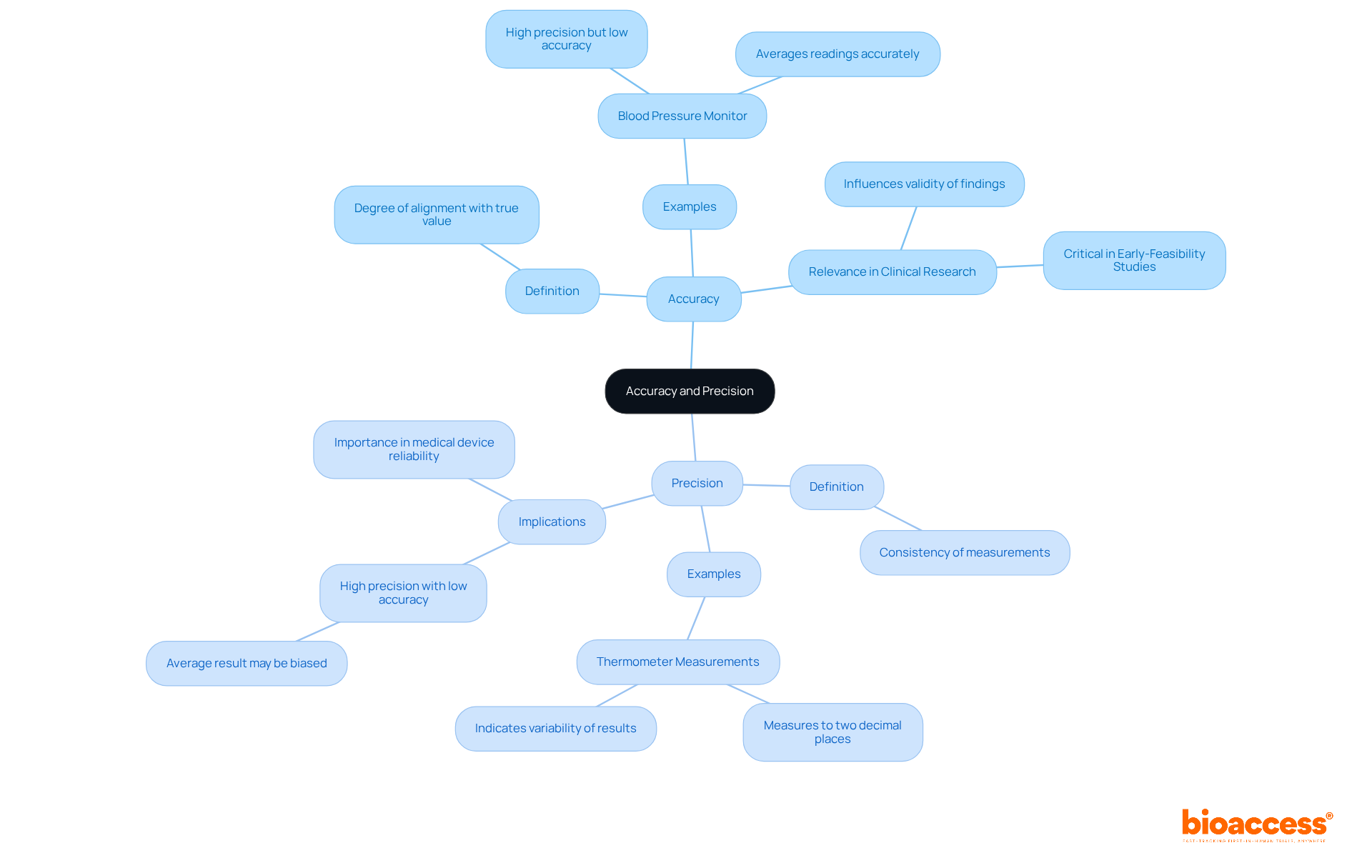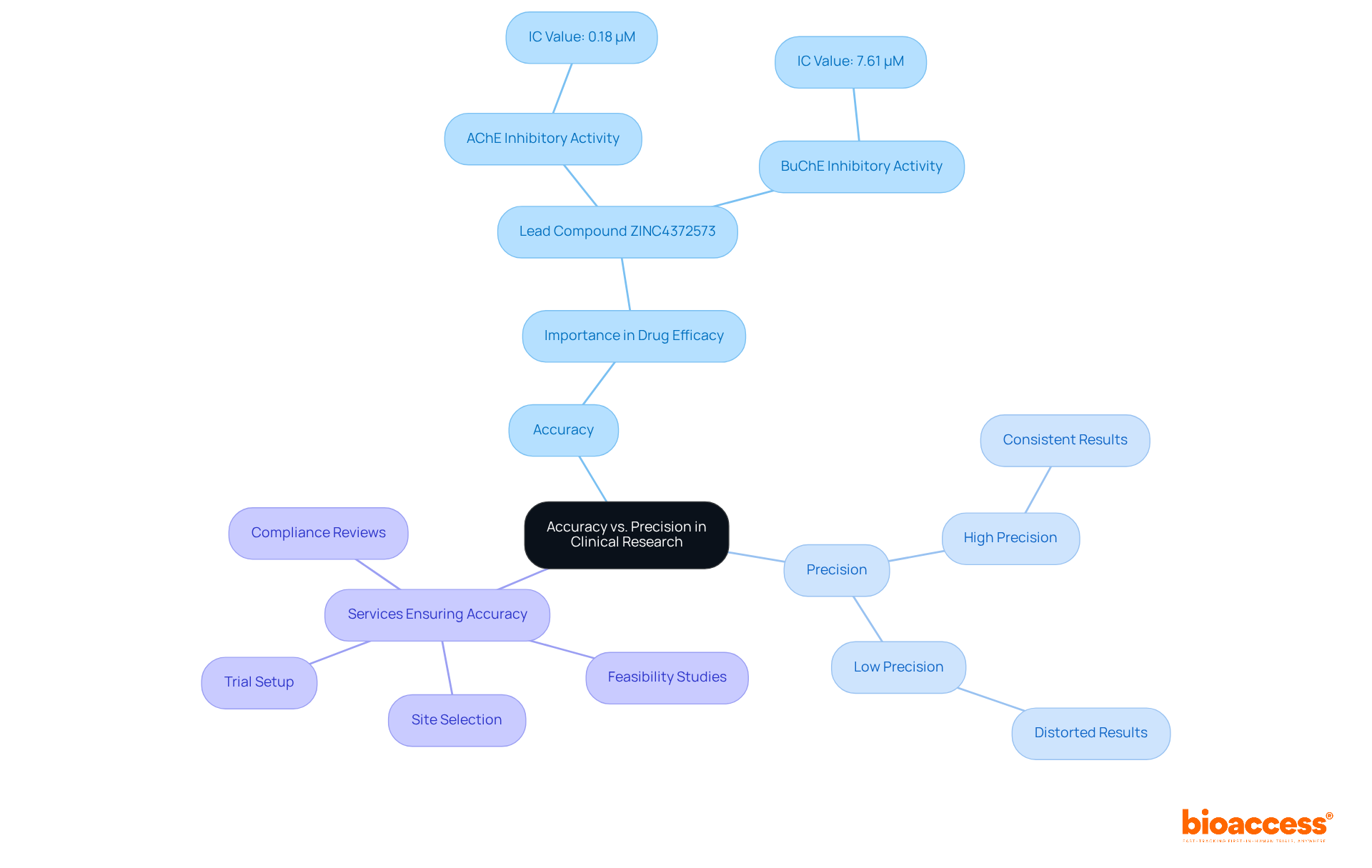


Accuracy is defined as the degree to which a measurement aligns with the true value, while precision refers to the consistency of repeated measurements. This distinction is crucial in clinical research, as both attributes significantly influence the reliability of study outcomes and the effectiveness of medical devices. The implications of accuracy and precision underscore the need for meticulous methodologies and quality control measures to ensure trustworthy results.
Understanding the nuances of accuracy and precision is vital in research, particularly within medical studies where the stakes are high. These two concepts, often used interchangeably, possess distinct meanings that can significantly influence the outcomes of clinical trials and the validity of findings.
As researchers navigate the complexities of measurement, they encounter the challenge of ensuring that their results not only reflect true values but are also consistently reliable.
How can researchers effectively balance these two critical attributes to enhance the credibility of their work and ultimately improve patient care?
The definition of accuracy and precision highlights that accuracy is the degree to which a measurement aligns with the true or accepted value, while precision refers to the consistency of multiple measurements. Consider a blood pressure monitor: if it reliably shows 120/80 mmHg while the true value is 130/85 mmHg, it illustrates high precision but low accuracy. Conversely, if the monitor averages readings of 130/85 mmHg, it is accurate; however, it may lack precision if the individual readings vary significantly.
Understanding these concepts, including the definition of accuracy and precision, is essential in medical device measurements and research studies, particularly within the context of extensive trial management services provided by bioaccess, which boasts over 20 years of experience in Medtech. High reliability and precision are crucial for ensuring that medical devices deliver dependable outcomes, ultimately impacting patient care and treatment decisions.
In clinical research, particularly in studies like Early-Feasibility Studies (EFS), First-In-Human Studies (FIH), and Pivotal Studies, understanding the definition of accuracy and precision is crucial as it can significantly influence the validity of findings. For instance, a study assessing the effectiveness of a new medication must ensure that both the accuracy of the dosage administered and the precision of the measurements recorded are maintained to draw reliable conclusions.
However, in scenarios where precision is low and accuracy is high, the average outcome may be accurate but not a reliable estimate of the true value. This situation necessitates an investigation into the cause of bias, as additional tests will not enhance the estimate of the biased result. Ian Yellowlees emphasizes, "You need to investigate and correct the cause of the bias, and the variability."
Real-world examples further elucidate these concepts: a thermometer that reliably gauges temperature correctly over numerous trials exemplifies high accuracy, while a device that measures temperature to two decimal points showcases enhanced precision. Striking a balance between these two attributes is essential for obtaining significant and trustworthy outcomes in medical research, particularly in the expedited medical device study services offered by bioaccess.

In clinical research methodologies, understanding the distinction between the definition of accuracy and precision and exactness is fundamental. The definition of accuracy and precision indicates that accuracy pertains to how closely a recorded value corresponds with the true effect size, while consistency reflects the reliability of results across repeated trials.
For instance, in evaluating drug efficacy, a measurement tool that consistently produces results near the true effect size demonstrates high precision. However, if those results are consistently distorted from the true value, the tool lacks precision. This understanding of the definition of accuracy and precision is crucial for researchers, as it influences their selection of methodologies and the interpretation of results.
Errors can occur due to faulty study designs, instrument limitations, or human mistakes, ultimately affecting research outcomes. Comprehensive research trial management services, such as those offered by bioaccess, ensure the definition of accuracy and precision is met through meticulous feasibility studies, site selection, compliance reviews, and trial setup. Each of these services plays a critical role:
For example, lead compound ZINC4372573 exhibits an AChE inhibitory activity with an IC value of 0.18 μM, underscoring the importance of accurate measurements in determining drug efficacy. Additionally, efficient project management and reporting enhance the trustworthiness of research outcomes, which can result in substantial effects on local economies, including job creation and healthcare enhancement.
Thus, attaining a harmony that reflects the definition of accuracy and precision is crucial for trustworthy findings and efficient decision-making in medical research. As Gregory L. Ginn observes, 'The examination of trial data is essential for identifying the real impacts of treatments and distinguishing these impacts from random variation.' This emphasizes the essential function that both exactness and correctness serve in the dependability of medical research outcomes.

In clinical research, the definition of accuracy and precision is paramount for ensuring the correctness and exactness of study results. For instance, when measuring patient outcomes, the use of precise instruments is crucial to ensure that repeated measurements yield consistent results. However, if those instruments are not calibrated correctly, the data may demonstrate a lack of the definition of accuracy and precision, leading to erroneous conclusions about treatment efficacy. Therefore, researchers must prioritize the definition of accuracy and precision in their methodologies to enhance the credibility of their findings.
At bioaccess®, our comprehensive trial management services—including Early-Feasibility Studies (EFS), First-In-Human Studies (FIH), Pilot Studies, Pivotal Studies, and Post-Market Follow-Up Studies (PMCF)—are meticulously structured to uphold these standards. Our team of specialists, boasting over 20 years of experience in Medtech, ensures that every aspect of trial management—from feasibility studies and site selection to compliance reviews and reporting—is diligently managed to guarantee the highest standards of correctness and detail in clinical outcomes.

To assess the definition of accuracy and precision in clinical research, researchers can utilize several methods, such as:
Consistently adjusting testing instruments against established benchmarks is essential for preserving precision. Control samples serve as references to verify testing processes, and by performing repeated tests and examining the standard deviation, we can gain insights into the definition of accuracy and precision by quantifying variability in data.
Current methods for enhancing precision and correctness involve:
The integration of the Medical & Safety Review (MSR) tool can further enhance data quality through features like change monitoring and history tracking, ensuring that all actions associated with data points are recorded and accessible.
Expert recommendations emphasize the importance of:
As emphasized by CluePoints, 'Accurate data is the backbone of successful trials,' underscoring the vital role of data precision in research outcomes. By adopting these strategies, including the proactive approach of Risk-Based Quality Management (RBQM), researchers can significantly enhance the quality of their data, thereby reinforcing the integrity of clinical research outcomes.

Understanding the nuances between accuracy and precision is essential for anyone involved in research, particularly in clinical settings. Accuracy reflects how closely a measurement aligns with the true value, while precision indicates the consistency of those measurements. This distinction is pivotal, as both elements play a critical role in ensuring the reliability and validity of research findings.
The article has explored the importance of these concepts in various contexts, including medical device measurements and clinical trials. It emphasized that high precision without accuracy can lead to misleading conclusions, while high accuracy without precision may not provide reliable estimates. Strategies such as calibration, control samples, and advanced statistical techniques are effective methods to enhance both accuracy and precision in research methodologies.
Ultimately, the significance of accuracy and precision cannot be overstated in the realm of clinical research. Researchers and practitioners must prioritize these elements to ensure that their findings are credible and impactful. By adopting robust measurement techniques and maintaining rigorous quality control, the integrity of clinical outcomes can be greatly enhanced, ultimately leading to improved patient care and informed decision-making in the medical field.
What is the difference between accuracy and precision?
Accuracy refers to how closely a measurement aligns with the true or accepted value, while precision indicates the consistency of multiple measurements.
Can you provide an example to illustrate accuracy and precision?
For instance, a blood pressure monitor that consistently displays 120/80 mmHg when the true value is 130/85 mmHg demonstrates high precision but low accuracy. Conversely, if the monitor averages readings of 130/85 mmHg, it is accurate but may lack precision if individual readings vary significantly.
Why are accuracy and precision important in medical device measurements?
Understanding accuracy and precision is essential in medical device measurements and research studies as they ensure reliable outcomes, which directly impact patient care and treatment decisions.
How do accuracy and precision affect clinical research studies?
In clinical research, particularly in studies like Early-Feasibility Studies (EFS), First-In-Human Studies (FIH), and Pivotal Studies, maintaining both accuracy in dosages and precision in measurements is crucial for drawing valid conclusions.
What happens when precision is low but accuracy is high?
In such cases, the average outcome may be accurate but not reliably estimate the true value. This situation requires investigating the cause of bias, as additional tests will not improve the estimate of a biased result.
Can you give an example of high accuracy and high precision?
A thermometer that consistently measures temperature correctly over numerous trials exemplifies high accuracy, while a device that measures temperature to two decimal points showcases enhanced precision.
Why is it important to balance accuracy and precision in medical research?
Striking a balance between accuracy and precision is essential for obtaining significant and trustworthy outcomes in medical research, particularly in expedited medical device study services.